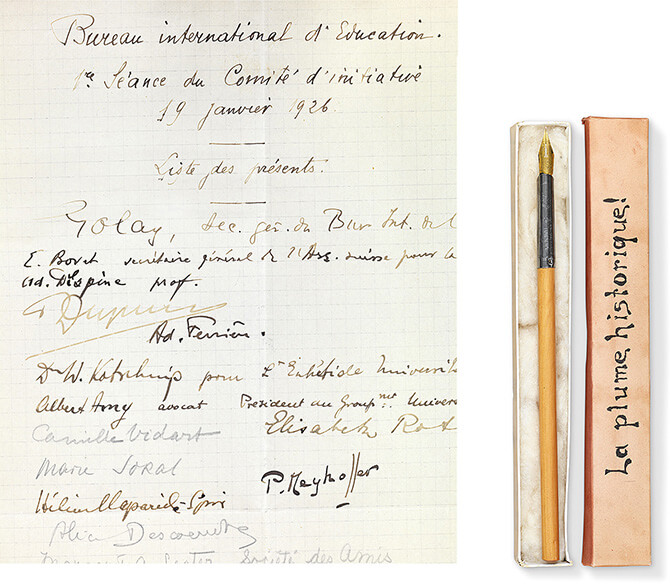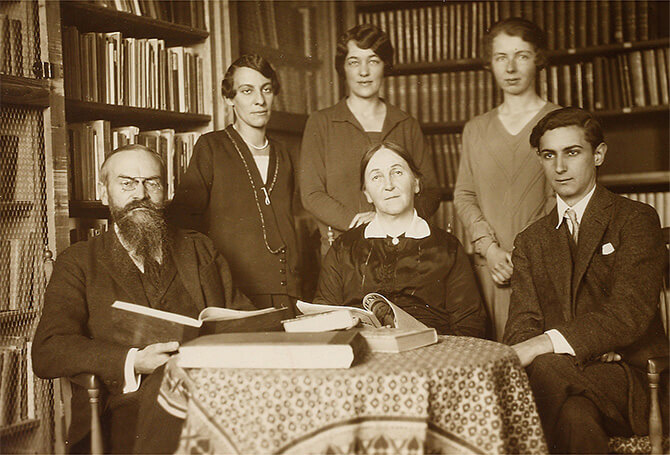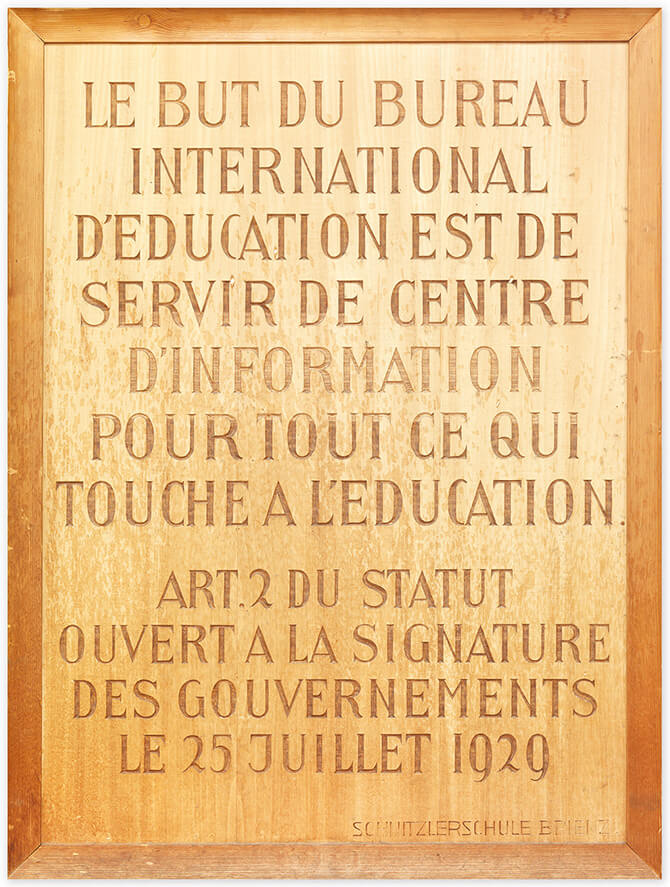
History
Nine Decades of Global Leadership in Education
October 20, 2016
The 20th century will easily go down in history as the century of the ‘‘institutionalization of the international’’ in the field of education. It all started in 1925, with the establishment of the IBE. In Focus 2015 looks back on and celebrates this amazing history.
illustration by multiple
The IBE was born from the intellectual discourse of leading thinkers and architects of the progressive education movement known as the New Education, including Edouard Claparède and Adolphe Ferrière.
By marco
20/10/ 2016
·
- Share
A Centre for Information and Scientific Research
In 1923, lead thinkers and members of the International League for New Education, including Edouard Claparède and Adolphe Ferrière, requested that Henri Bergson, in his capacity as the President of the League of Nations Commission for Intellectual Co-operation, recommend the establishment, in Geneva, of an International Bureau of Education.
Thanks to a US $5,000 grant from the Rockefeller Foundation, the governing board of the Jean-Jacques Rousseau Institute, founded in 1912, voted to establish the IBE to promote international cooperation in education. On December 18, 1925, the IBE was established as a centre for information and scientific research, with Pierre Bovet as its first director and Adolphe Ferrière and Elisabeth Rotten as his deputies. A committee including such influential figures as Albert Einstein, then a member of the League of Nations International Commission for Intellectual Cooperation, was set up to raise funds for the IBE.

Partial list of participants in the first IBE committee meeting, 19 January 1926. The historic pen used to sign the IBE accord in 1929, when it became an intergovernmental organization, and again in 1969, when it became a UNESCO Category I institute.
The founding mothers and fathers of the IBE envisaged that, as part of its core mandate, it would collect and share information on education research and promote ways to apply it. This envisaged role of the IBE still resonates today. In the articulation of the IBE’s medium-term programmatic focus (2015–2020), Director Marope places a very strong emphasis on the IBE’s role as knowledge broker. She envisions that, from 2015 onwards, the IBE will not only continue to collect and share cutting-edge research findings, but will also rearticulate those findings ‘to make their implications for policy and practice more apparent’. Thus, it will continue to bridge the gap between knowledge creation and application. The IBE’s practice of disseminating knowledge to prospective users also dates back to its founding years. By 1929, with only three or four full-time employees working in a miniscule office, the IBE had organized ten international congresses, working with the League of Nations and several research and professional associations. Its ‘‘pedagogical tour of the world’’ had already reached 70 countries, across all continents. Equally ancient is the IBE’s role in capacity development, a part of which includes direct training. Driven by ideals of pacifism and universal fraternity, the IBE organized courses, study visits, exhibitions, and conferences featuring issues of current concern such as education for peace.

The first IBE Director, Pierre Bovet, with his team, 1925.
THE FIRST INTERGOVERNMENTAL ORGANISATION
Jean Piaget was clearly the longest serving director of the IBE (1929–1969). But, since its establishment in 1925, the IBE turned new pages under several directors, reinvented itself, and distinguished itself as a lifelong learning institution. In this regard, 1929 was a landmark year. Four years after its establishment, the IBE extended membership to governments across the globe and became the first inter-government institution on education: the cradle of “global education”, as we know it today! For the first time in history, governments had a global platform through which they could commit to collaborating around commonly agreed challenges and priorities in education. From a humble start with only three founding members (Spain, Poland and the Republic and Canton of Geneva), a mechanism for global agenda setting in education was born. In 1934, the IBE formally convened a global governmental forum on education: the International Conference on Public Education (ICPE). The ICPE was held annually until 1946, except during the war years. With the Swiss Federal Council acting as intermediary, the ICPE was a forum where, by invitation, ministries of education reported and exchanged ideas on education developments in their respective countries.
A global convening agency was born—and with it, the convening power of the IBE, which is even stronger today. While it did offer country membership, the IBE opened its conferences and other activities to any government that chose to participate. The ICPE brought together more and more countries, facilitating a growth in country membership to three more by 1930 (Egypt, Ecuador, and Czechoslovakia), 20 by 1950 and 195 by 2015, the latter growth greatly enabled by being part of UNESCO.
Over time, national reports from the IPCE provided crucial information on global trends in education, including policies across various countries and regions. For decades, researchers and scholars worldwide mined this unique collection and shared with the world a wide range of research findings, studies and trend analyses. Between 1933 and 1971, the IBE published summaries of these reports in the International Yearbook of Education, with UNESCO becoming the co-publisher after 1948. The IBE also released its own independent publications, starting in 1930, and continues to do so.

The aim of the International Bureau of Education is to serve as an information centre for everything that relates to education. Art. 2 of the Statutes Ready for the signature of the governments July 25, 1929.
From a centre for research and information to a global comparative education centre
The illustrious history of the IBE owes as much to its broader membership as to its intellectual leadership. For forty years after the the IBE became an intergovernmental institution in 1929, served as its director; Pedro Rosselló, a Spanish educationist and a fervent advocate of comparative education, was his deputy. As a world renowned psychologist, theorist of the development of intelligence and one of the leading thinkers of the 20th century, Piaget had a reputation that carried the IBE around the world. In the last year of his directorship, along with his aides, he negotiated the integration of the IBE into UNESCO. After 1945, the IBE began collaborating with the newly established UNESCO on education issues. It also established closer links with comparative education centres around the world. These partnerships catalyzed the creation of regional comparative education societies and an international council of comparative education. With its audience expanding since the 1930s, the IBE “asserted its independent and scientific character and publicly proclaimed its status as a global centre for comparative education” (Hofstetter, 2015, p. 39).
In 1946, the IBE started to convene the ICPE together with UNESCO; in 1970 the name was changed to the International Conference on Education (ICE), in recognition of other education providers beyond governments. The ICE has sustained its role in setting the global education agenda up to the present. Key global policies in education across the decades can be traced to the ICPE and the ICE: the duration of compulsory education (1934); education for international understanding (1948, 1968 and 1994); access of women to education (1952); literacy and adult education (1965); the role of teachers (1975 and 1996); the universalization and renewal of primary education (1984); improvement of secondary education (1986); and inclusive education (2008).
International centre for contents and methods in education
In the late 1990s, the mandate of the IBE changed yet again: It became an international centre for developing contents and methods of education. This change refocused the IBE on improving the quality of education through the instrument of the curriculum. Initially under the directorship of Cecilia Braslavsky (2000–2005), the IBE focused increasingly on curriculum, offering technical and policy advice to many countries and helping them strengthen their capacity in the field. The 2001, 2004, and 2008 ICE sessions tackled themes with much closer implications for the curriculum: education for learning to live together, education of young people, and inclusive education.
A global centre of excellence in curriculum and related matters
The trend toward a stronger focus on curriculum was finally solidified in 2011, when the 36th session of the UNESCO General Conference decided to transform the IBE into a global Centre of Excellence in Curriculum (CoE) and related matters. Years earlier, with director Cecilia Braslavsky at the helm, the IBE had begun to work around three program areas: capacity building; policy dialogue; and resource bank and observatory of trends. The strategy for reaching its status as a global CoE was finally adopted in 2011, under the directorship of Clementina Acedo (2007–2014). As a way of realizing this strategy, the IBE articulated and began to implement three program areas: capacity development and technical assistance; knowledge production and management; and policy dialogue on curriculum issues and trends.
Reaching for excellence in curriculum and related matters
Mid-2014 witnessed a dramatic transformative chapter of the IBE. Mmantsetsa Marope took the reins as the new director; she brought to the office her extensive and varied experience from schools, the civil service, academia, and bilateral and multilateral agencies in education. Under her leadership, the IBE resolutely focused on its role as the global CoE in curriculum and related matters. Because the curriculum relates to practically all matters of education, She and her team decided to focus on three matters that most closely relate to the curriculum: learning, teaching, and assessment.
Five medium-term program areas were articulated for accelerating progress towards excellence in the IBE’s areas of competence: curriculum, learning, teaching, and assessment. From 2015, the IBE sought to optimize the contribution of the curriculum to enhance key elements of education: education quality, development relevance, resource efficiency, equity, and effective learning. It is working painstakingly to improve the functioning of education systems as enabling environments for effective curriculum implementation. To this end, Director Marope introduced into the IBE’s work program a systemic approach to improve these elements. The fourth program area of the IBE therefore speaks
directly to the fourth Sustainable Development Goal (SDG4). She also called for a dramatic paradigm shift on the curriculum, repositioning it as an indispensable tool for putting into operation policies that make education more relevant to development. These include efforts to develop future competencies, to implement lifelong learning policies, and to develop an integrative core to make education systems more coherent, along with a tool for infusing a futuristic technology perspective into education systems.
In Incheon, Korea, Director Marope pointed to two elements—the systemic approach to improving education and learning, and the global paradigm shift on curriculum—and placed them squarely on the agenda of high-level debates of the 2015 WEF. The IBE made a mark on the Incheon Declaration, which will guide the world in operationalizing SDG4 and the global Education Agenda until 2030.
Back at home in Geneva, 2015 was the year for the IBE to decisively turn a new page: rebranding the IBE flagship outputs and focusing them on the CoE mandate. With passion, unflinching resolve, and tested experience, the IBE is ready for more to come in 2016.
